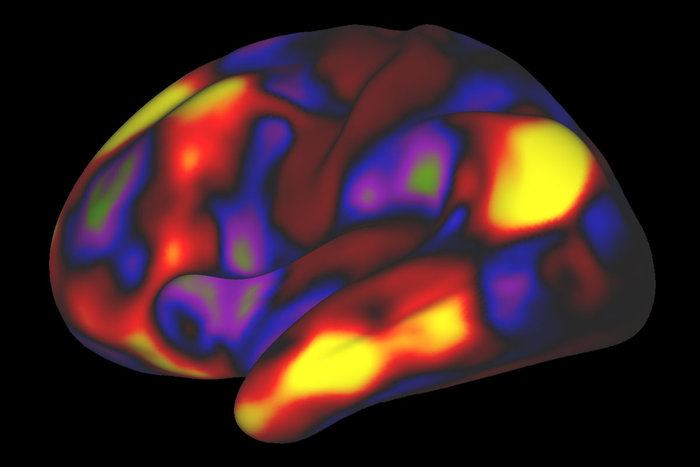A large study that investigates just what keeps our brains sharp as we age and what contributes to cognitive decline has been launched by researchers from Washington University School of Medicine in St. Louis, Harvard University/Massachusetts General Hospital, the University of Minnesota Medical School and the University of California Los Angeles (UCLA).

Credit: Matthew Glasser/Washington University
A large study that investigates just what keeps our brains sharp as we age and what contributes to cognitive decline has been launched by researchers from Washington University School of Medicine in St. Louis, Harvard University/Massachusetts General Hospital, the University of Minnesota Medical School and the University of California Los Angeles (UCLA).
Known as the Adult Aging Brain Connectome study, the project is funded by a $33.1 million grant from the National Institute on Aging, part of the National Institutes of Health (NIH). It will build on foundations laid by the Human Connectome Project. The Human Connectome Project and subsequent connectome studies mapped the anatomical and functional connections among brain areas in healthy children and adults of many ages, providing invaluable insight into normal brain structure and function across the life span.
Using techniques developed for the Human Connectome Project and the subsequent Mapping the Human Connectome During Typical Aging study, the Adult Aging Brain Connectome study will follow 1,000 younger, middle-aged and older adults over several years, taking multiple brain scans and collecting other data to help the researchers understand how each individual’s brain changes over time. The scientists will aim to identify factors that put people at risk for, or protect them from, cognitive decline.
“We’re looking at risk and resilience,” said co-principal investigator Beau M. Ances, MD, PhD, the Daniel J. Brennan, MD, Professor of Neurology at Washington University. “What are the factors that increase an individual’s risk of cognitive impairment? What confers resilience? Are there key inflection points during an individual’s lifetime or certain factors that they’re exposed to that put them on a path toward cognitive impairment? We are studying participants across a large age range to try to answer these important questions.”
The study is divided into four projects. The first looks at the effect of potentially harmful factors such as stress and inflammation on the brains of young adults. The second investigates the role of lifestyle factors such as exercise during mid-adulthood. The third studies hormonal changes that occur around the time of menopause, and their effects on brain function and structure. And the fourth looks at older adults who have retained their mental acuity well into their later years, to identify factors that protect them from Alzheimer’s disease and related dementias.
Along with Ances, the project is led by co-principal investigators Susan Bookheimer, PhD, a professor of psychiatry and biobehavioral sciences at the David Geffen School of Medicine at UCLA; David Salat, PhD, an assistant professor of radiology at the Athinoula A. Martinos Center for Biomedical Imaging at Harvard Medical School/Massachusetts General Hospital; and Essa Yacoub, PhD, a professor of radiology at the University of Minnesota.
The goal is to obtain at least three brain scans from each participant over about a 10-year period. Some participants already may have participated in the Mapping the Human Connectome During Typical Aging project and will provide two additional scans. Participants also will undergo regular cognitive testing and provide blood samples to be analyzed for molecular signs of Alzheimer’s disease, inflammation and other biological processes. The researchers also plan to perform genetic analyses for inherited risk and protective factors.
A key aim of the project is to ensure a racial and ethnically diverse participant group so that the findings will be applicable to people of many backgrounds. The project’s Diversity Recruitment and Retention Unit is designing culturally sensitive and appropriate strategies to encourage the participation of people from under-represented groups such as African Americans and Hispanics.
When the project is complete, the researchers will have imaging data on 1,000 people, showing how their brains change over several years, coupled with demographic, genetic, molecular and cognitive data on each person. Like their predecessors at the Human Connectome Project and Mapping the Human Connectome During Typical Aging study, the researchers leading the Adult Aging Brain Connectome project plan to make all of the data publicly available so other researchers can answer additional questions about human health and disease.
Key members of the research team at Washington University include Matthew Glasser, PhD, a research fellow in radiology who leads the processing core; Michael Harms, PhD, an associate professor of psychiatry who leads the acquisition core; Carlos Cruchaga, PhD, a professor of psychiatry, of genetics and of neurology who leads the genetics and multiomics specimens core; Daniel Marcus, PhD, a professor of radiology who leads the informatics core; and Ganesh Babulal, OTD, PhD, who leads the diversity, recruitment and retention unit.




